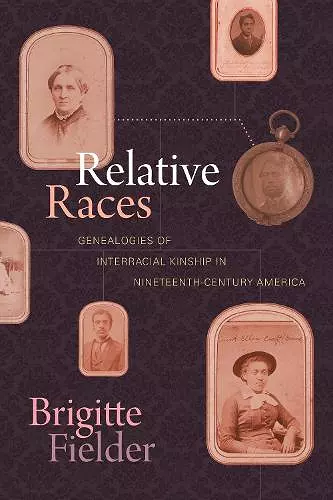Relative Races
Genealogies of Interracial Kinship in Nineteenth-Century America
Format:Paperback
Publisher:Duke University Press
Published:30th Oct '20
Currently unavailable, and unfortunately no date known when it will be back

In Relative Races, Brigitte Fielder presents an alternative theory of how race is ascribed. Contrary to notions of genealogies by which race is transmitted from parents to children, the examples Fielder discusses from nineteenth-century literature, history, and popular culture show how race can follow other directions: Desdemona becomes less than fully white when she is smudged with Othello's blackface, a white woman becomes Native American when she is adopted by a Seneca family, and a mixed-race baby casts doubt on the whiteness of his mother. Fielder shows that the genealogies of race are especially visible in the racialization of white women, whose whiteness often depends on their ability to reproduce white family and white supremacy. Using black feminist and queer theories, Fielder presents readings of personal narratives, novels, plays, stories, poems, and images to illustrate how interracial kinship follows non-heteronormative, non-biological, and non-patrilineal models of inheritance in nineteenth-century literary culture.
“In Relative Races, Brigitte Fielder enriches our understanding of the cultural landscape of the long nineteenth century. Demonstrating boldness, analytical clarity, and scholarly creativity, Fielder gives us language for the processes of racialization that clearly shape American realities but that we have often failed to name because we lacked a theoretical framework.” -- Koritha Mitchell, author of * From Slave Cabins to the White House: Homemade Citizenship in African American Culture *
“Brigitte Fielder makes the bold claim that racialization entails neither the annihilation of kin ties nor the simple linearity of descent. Instead, ‘race,’ and blackness in particular, travels unpredictably, transferred from skin to skin, from child to mother, across literary genres, through adoption, via residency, and through sibling relations. In essence, Fielder retheorizes race as the making and breaking of kin ties. After Relative Races, we will not be able to think about race and racialization, kinship, and queer theories of temporality separately again.” -- Elizabeth Freeman, author of * Beside You in Time: Sense Methods and Queer Sociabilities in the American Nineteenth Century *
“Brigitte Fielder’s Relative Races is a sophisticated addition to ongoing discussions of race, kinship, and community.... Fielder’s rereadings of historical episodes of kinship in domestic spaces in the 19th century urge us to revisit the archives, and shed light on stories that have been erased and ignored."
-- Mary Rambaran-Olm * Public Books *“Brigitte Fielder’s Relative Races expertly navigates new discussions centering on nineteenth-century representations of racialization in the United States. . . . Fielder’s work has broad-reaching effects and implications for the twenty-first century and beyond.” -- Tabitha Lowery * Early American Literature *
“In her reconsiderations of kinship and racialization, Fielder brilliantly constellates important critical emphases central to recent interventions in queer theory . . . and Native studies. . . . Fielder’s work is both a call and an itinerary––a praxis and a map––for productively unsettling normative relations in the U.S.” -- Shelby Johnson * ABO *
“[Relative Races] is a text that embodies its arguments about excessive and attenuated kindship ties under slavery, the circulation of ideas about racialization, and the many paths of racialized kinship. . . . This important new book of literary history illustrates alternative genealogies and possible futures to combat anti-Black racism. -- Jolie A. Sheffer * American Literary History *
ISBN: 9781478011156
Dimensions: unknown
Weight: 476g
328 pages